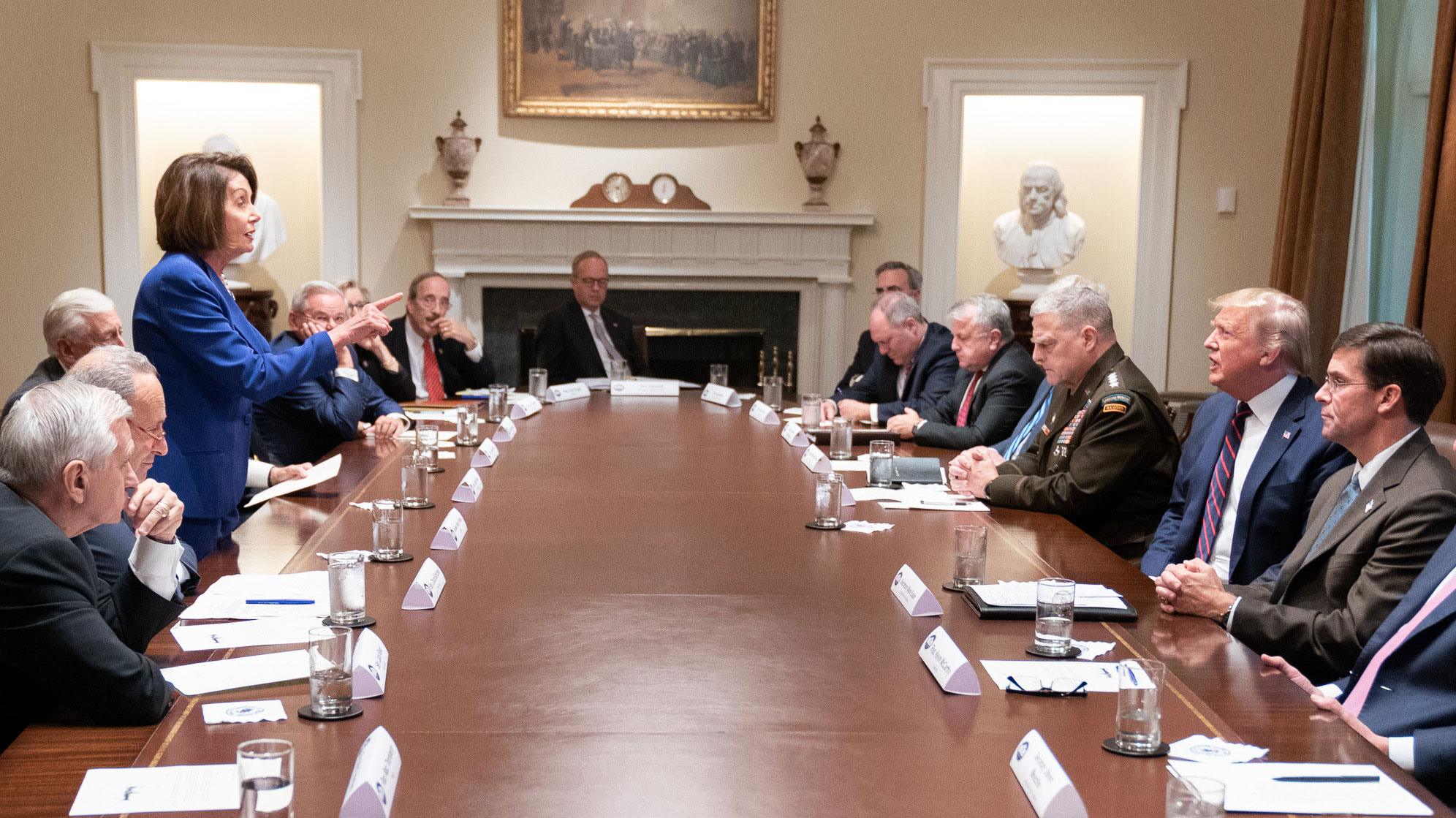Berkeley scholar warns U.S. liberals: Either get tough, or get ready to lose
In a new book, political scientist M. Steven Fish argues that pro-democracy forces need to deploy a “high-dominance” political style to defeat Trumpism. And, he says, they need to stop being so squeamish about patriotism.

White House photo by Shealah Craighead
July 16, 2024
Repeatedly in the last three weeks, political events have caught Democrats off-guard and put them on their heels: President Joe Biden’s disastrous performance in a debate with challenger Donald Trump, a disappointing Biden interview, and, on Saturday, the attempted assassination of Trump. While the Democrats have been mired in uncertainty and defensiveness, Trump, even bloodied, has projected fiery energy.
For UC Berkeley political scientist M. Steven Fish, this anxious moment is the culmination of several decades since liberals ceded the art of political combat to the right. In a new book, Comeback (Rivertowns Books, May 2024), Fish offers a deeply provocative and often devastating critique of the left’s timorous approach to political communication.
And, he writes, if progressives don’t muscle up — now — then democracy itself could be lost.

Fish’s analysis is openly partisan, a sort of tough-love message to his allies. He grew up in Kentucky, and he has a lived understanding of the heartland and working-class values that sometimes escapes progressive leaders on the coasts and in major urban centers. He’s written extensively about democracy and its opponents, in the U.S. and globally.
His data-based critique centers on a couple of core ideas, both of them counterintuitive: First, the left needs to embrace a positive patriotism. It needs an overarching story of how liberal values across centuries have advanced power and opportunity for women, people of color, immigrants and young people, and defended the poor and working classes against predatory capitalism.
Second, Fish says, because that progress is always under attack from the right, liberals and their leaders need to renew their commitment to what he calls “the politics of dominance.”
Voters “want to be on the winning team,” he writes. “They favor leaders who project indomitability rather than vulnerability. They admire and trust leaders with stiff spines and strong principles. In a word, people gravitate toward high-dominance leaders.”
In an interview with Berkeley News, Fish detailed how dominance politics and capturing the flag can win elections and advance a more just, compassionate society.
This interview has been edited for length and clarity.
Berkeley News: The country is still coming to grips with the shooting that wounded President Donald Trump at a campaign rally a few days ago. Does this event change how Democrats should approach the campaign, especially since they were already struggling in the aftermath of the last presidential debate?
M. Steven Fish: The assassination attempt might give Trump a small bump in the polls, but that will probably pass and likely won’t affect the Democrats’ overall strategy.

Gene J. Puskar, Associated Press
As ever, winning elections is about appealing to values and emotions more than material interests. Voters favor candidates who seem like the most powerful leaders and who make them feel best about themselves and their country.
The Democrats have lost track of this fact. They are doing what they always do these days, which is running on the issues, even though there’s no evidence that that approach is moving the needle. They also have an unfortunate tendency towards defeatism, which is now coming to the fore as they assume recent events will assure Trump’s victory. This pessimism is completely unwarranted, extremely damaging and must be shut down.
Trump is a singularly disliked figure, and history shows us that whatever polling bump he gets from recent events like the assassination attempt will probably pass.
Everything we hold dear is on the line. Liberals need to start messaging and fighting like we get this fact. The task at hand for the Democrats is rooting their messages in compelling narratives that establish their reputations as patriots, unifiers of the nation and guardians of national values.
If they’re going to change the game and defeat Trump, they’re going to have to adopt what I call high-dominance messaging and an emotionally compelling brand of liberal nationalism.
We’re a few weeks out from the debate between Biden and Trump that transformed the 2024 presidential election, and maybe changed U.S. history. As a critic of Democratic communication tactics, what have you been focusing on as this plays out?

Throughout his presidency, Biden has been playing, for the most part, a low-dominance game. Now, with his back against the wall and his own partisans urging him to step down, he’s actually stepping up his dominance game. He’s saying, “I’ll see you at the convention. Try to take me out there.” That’s exactly how he’s supposed to act every day.
It’s remarkable that he’s only doing this out of desperation. I don’t know if it’s going to work, but frankly, that’s the right attitude. There’s a very good argument for stepping aside, but if he’s going to stay in, the best way to surmount the age problem is to play a high-dominance political game. After all, the reason that his age is a problem is that it makes him look feeble.
People favor leaders who they regard as strong, as capable of mastering their political opponents. If you look at the data, what you’ll find is that the candidates who are regarded as more knowledgeable win about half the time. Candidates who are regarded as “caring more about people like me” win about half the time. The candidates who were viewed as the stronger leader? They rarely lose.
‘High dominance’ is such a provocative term, and maybe open to misinterpretation. Can you sketch out how it might work in practice?
The concept of dominance might seem illiberal to us, and it’s especially challenging for some liberals now because Trump is so high-dominance — in fact, dominance is all he’s got. He’s a charging alpha chimp. He’s sexist and abusive and bellicose and arrogant and everything else we hate.

bswise via Flickr
But Democrats and liberals have their own high-dominance tradition. Frederick Douglass, Franklin Delano Roosevelt, Martin Luther King — these are extraordinarily high-dominance leaders. They strove to make opinion, rather than just reading polls. They were risk-accepting rather than risk-averse. They played to win and win big, not just to avoid loss. They sometimes used provocative, transgressive language. They strove to thrill people, to inspire people, not just appeal to their material interests.
“Own” the libs? Nobody ever owned FDR, JFK or MLK. And can you imagine Lyndon Johnson having accomplished what he did, this historic legacy of progressive reform, without his high-dominance style? We need to recover that tradition.
Roosevelt was first elected president in 1932, nearly 100 years ago. Tell me how he practiced high-dominance politics and captured the flag.

Photo by Leon A. Perskie
Here’s an example: He gave a campaign speech right before the 1936 election. He’s talking about everything he’s done to reduce taxes on working people and raise taxes on the wealthy. One by one, after every item on that list, he asks: “Wasn’t that the American thing to do?”
Then he says: “In this election, we have a choice. Are we going to turn our tax policy back over to privilege? I know the American answer to that question.”
He tethered his progressive programs to the flag. And he honored the pride of working folks. What do the Democrats do today? They throw a pity party for working-class Americans.
In another speech he gave just before his first reelection, FDR invited the plutocrats’ hatred and added: “I should like to have it said of my first administration that in it the forces of selfishness and of lust for power met their match. I should like to have it said of my second administration that in it these forces met their master.”
That’s winning language that excites your base, attracts swing voters and earns respect.
There’s no doubt that Democrats have been struggling to connect with heartland voters, especially white working-class voters. In your view, how could they overcome that problem?
We tell this story about how the working person is desperate. Listen to the rhetoric: “You poor, struggling working families. We’re here to get you a break so you can squeeze by.”
That doesn’t work for the folks where I grew up, and it doesn’t work very well anywhere else, either. Working class people, like everyone else, want to be regarded as prosperous, as forward-looking, as self-reliant and living lives that are full of possibility. The Democrats’ message often ignores the human need for respect.
So if you were to reengineer that message, what does it look like?
If the truth-tellers can’t present their message with greater verve and chutzpah than the other side … their opponents’ lies are going to be accepted as truth.
M. Steven Fish
Voters vote for leaders who actually inspire them. They vote for people who make them feel great about their country and future prospects. They vote for leaders who they regard as strong commanders, who can really take it to the other side.
People do not vote based on infrastructure spending. Strong political leaders know that they can talk about policies, but they wrap their policies in a captivating story about our country, about showing the world what we’re made of.
Again, though — Trump inspires people. His base sees him as strong. Should Democrats somehow mirror his tactics?
Absolutely not. Democrats need to overmatch Trump’s dominance, not emulate his style. If you look at the news over the last eight years, every time I open cnn.com or read the New York Times or watch Fox News, it’s all Trump all the time. Why? Because Trump is provocative. He says interesting things. He doesn’t seem to give a damn what people think. He tells you what he believes and what he wants you to believe, not what he thinks you want to hear.

Photo by Adam Schultz / Biden for President via Flickr
That’s what makes news. That’s what gets clicks. That’s what earns respect. That’s his superpower.
When Harris and Biden can’t even make the headlines, it’s because they’re so boring. Democrats gnash their teeth and say, “Why don’t people care about policies? That’s what they should be voting on.”
But we live in an age of infotainment and public addiction to spectacle. If the truth-tellers can’t present their message with greater verve and chutzpah than the other side, they’re not going to be heard. They’re going to lose, and their opponents’ lies are going to be accepted as truth.
But isn’t it inevitable that many people might equate the politics of dominance with an anti-democratic impulse? They might think it sounds very close to “the politics of testosterone.”
Politics is always a blood sport … now, more than ever. If you’re squeamish about dominating your opponents, you shouldn’t be in this game.
M. Steven Fish
There is nothing illiberal about dominance politics. Dominance is about having the courage of your convictions. It’s about leading rather than just following polls. Taking risks. Being on the offense all the time. Opponents are supposed to be offended. Democrats are so concerned about being offensive that they can’t rouse their own followers.
Look, we’re at war here. Politics is always a blood sport to some extent — but right now, more than ever. If you’re squeamish about dominating your opponents, you shouldn’t be in this game.
Let me put it another way: As a matter of fundamental character, it seems to me that liberals, progressives, are deeply wary of dominance — it’s almost antithetical. They’re much more about compassion, collaboration, building consensus. About sharing power equally and respectfully as a basic principle of human relationships.
And when you suggest that this could be seen as a politics of testosterone — in fact, dominance is absolutely not a male thing, still less a toxically male thing. Some of the strongest, most high-dominance politicians right now are women. They’re leading the way in many respects.

kmu.gov.ua via Wikimedia Commons
There is absolutely no contradiction between collaboration, cooperation and empathy on the one hand and dominance politics on the other. FDR, JFK and LBJ, to take just three examples, were very high on those qualities. They were also high-dominance politicians.
Kaja Kallas, the prime minister of Estonia — she’s young, she’s female. She’s taking it to Vladimir Putin. She’s taking it to her own ethno-nationalists at home in Estonia, and she’s beating them in elections. They’ve got their own Trump, and she just kicked his butt.
Sanna Marin, former prime minister of Finland, is another one.
How about in the U.S.?
Jasmine Crockett, a member of Congress from Texas — I’ve got a whole chapter about her in Comeback. She is a high-dominance archetype. And Nancy Pelosi, the former speaker of the House, obviously.
Dominance is just a tool — it can be used for good or ill. Right now the Republicans are using it for corrupt, unpatriotic, anti-democratic, anti-American ends. We can use it to promote decency, democracy and equality. When the bad guys are seen as stronger than the good guys, we’re in trouble.
You just mentioned patriotism — let’s talk about that. One of the most striking ideas in Comeback is that liberals, over the last half-century, have made a grave error by abandoning patriotism and rejecting nationalism. In essence, you say, they’ve ceded the flag to the right, at great cost.
To reject patriotism and claim that you should be in charge of the country is a complete contradiction.
Imagine someone who’s interviewing for a top job at a firm. Now, if that candidate does not show you that he or she is on fire with excitement about the company’s potential, its accomplishments, but instead frets over the firm’s many liabilities and its failures, are they going to get the job?
When I hear people say that they don’t like patriotism, what they’re saying, basically, is they think they’re better than Thomas Jefferson and Frederick Douglass and Ida B. Wells and Martin Luther King and John F. Kennedy and the masses of ordinary Americans who have lived and died to keep the country free and make it better. Most people everywhere are proud of and grateful for their citizenship, and they want leaders who are as enthusiastic about the country as they are.
As you describe it, MAGA and illiberal forces have an overarching story that’s engaging and inspiring, even if it’s based on tribal resentment and, often, on lies. In a nutshell, “Make America Great Again.” But you write that liberals in the U.S. don’t have such a story of national greatness — and that’s a weakness, because such stories are essential to unite and inspire a strong political movement.
We’ve got a choice here: On the one hand, you have a cramped ethno-national version of the country that defines America largely as a native-born, white Christian entity. On the other side, you have a vision of a country that includes all of its citizens. We’re all in this together. We’re all equal, regardless of the recentness of our immigration, regardless of our ethnicity, where we came from, how we worship.

Adam J. Dewey/NurPhoto via Associated Press
If you’re good with the ethno-national version, just leave the flag in their hands. But if you would prefer a country where everybody’s treated equally, everybody’s citizenship is honored, and we’re all in this together, then you better take the flag the hell back from the ethno-nationalists.
The problem is, if you wave a flag these days, or if you put a flag bumper sticker on your car, if you wear a T-shirt with the flag on it, people will suspect you of being MAGA. When you get to that point, you are in big, big trouble.
So what would you suggest as a liberal alternative to MAGA’s ethno-nationalist story of greatness?
Something like this:
The United States was founded for the purpose of self-government, and our history has largely been an effort to expand the blessings of liberty to larger and larger groups of Americans. Finally, in 1965, we became a full democracy when African Americans in the South got the right to vote. That’s who we are as Democrats.
This country has its faults. We have a horrific history of racial oppression. But look at the incredible progress we’ve made, from the heinousness of slavery, to the idiocy of Jim Crow, to the mighty mind of Ketanji Brown Jackson, the first Black woman on the U.S. Supreme Court.
That’s what we Democrats are about.
Martin Luther King was a first-class nationalist. The way he talked about the United States was remarkable. He was forever talking about our great nation, America moving on to its greatness, and telling these glorious stories about American progress, while never ignoring its past failures and current challenges. That’s what made his message so appealing and opened the hearts of so many people.
Democrats today are afraid of raucously celebrating progress. But you’ve got to do that. Liberals often think it will sound offensive to those who still suffer. But the country has made enormous progress. And if you want to inspire your voters, you have to constantly hold in front of them examples of progress already made, progress you and your party are responsible for.
Spreading the blessings of liberty to all Americans is what America is all about. Liberals have to proclaim how it was done in the past and how we’re going to keep doing it in the future. Talk about how you’re doing to beat everybody who wants to go backward. Offer a stirring vision. Forget about prescription drug prices and quit treating voters like despairing stiffs in dire need of a government break.
Do that — or get the hell out of the way and make room for leaders who will.